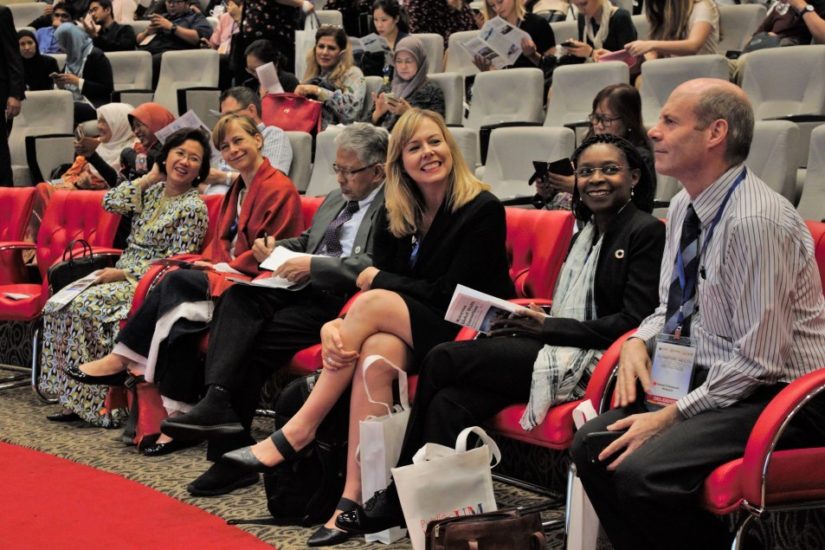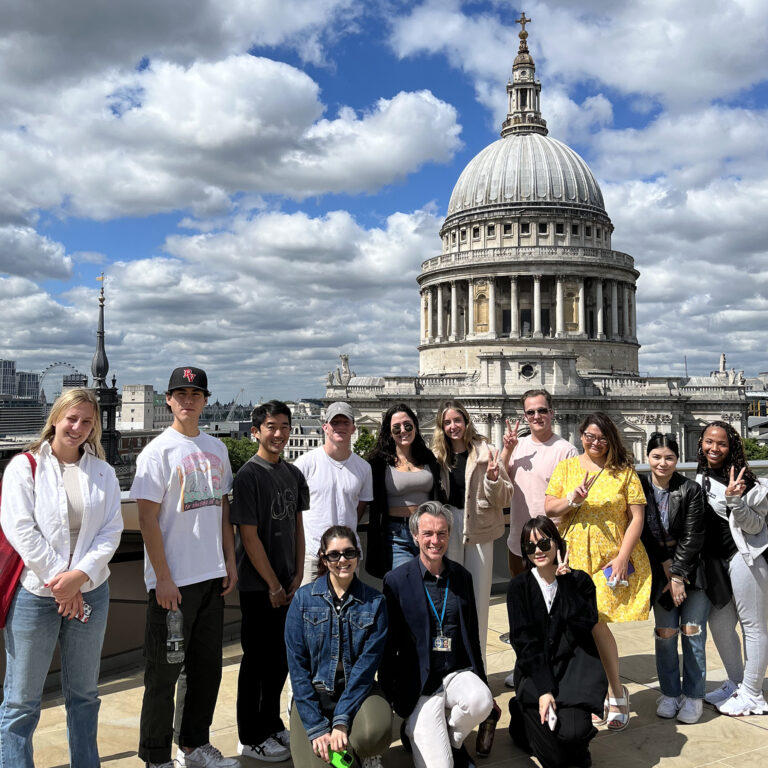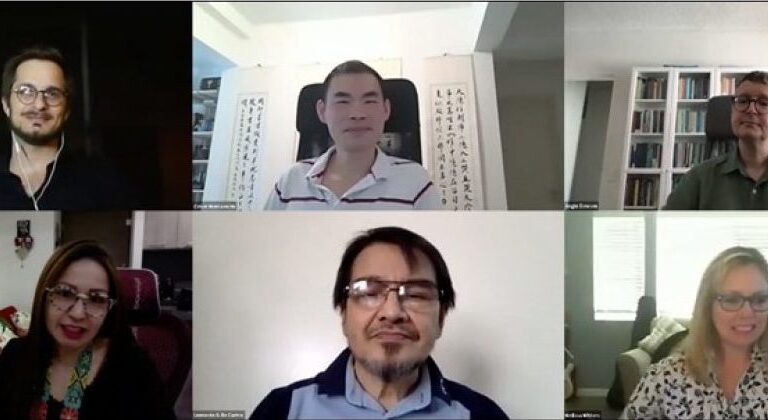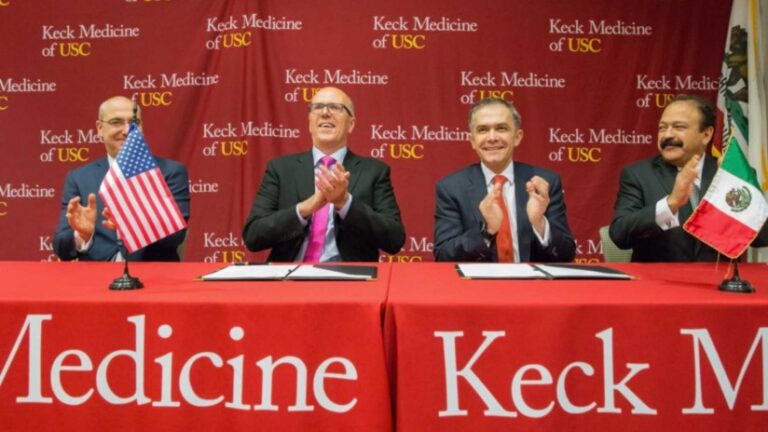
APRU Global Health Conference 2018, Mellissa Withers (center). (Photo/APRU Global Health Program)
USC-based Global Health Program highlights interdisciplinary collaboration in the time of coronavirus
The work of APRU Global Health Program, which is housed at USC, is a welcome meeting of the minds, rooted in collaboration & communication.
In the shadow of the United States leaving the World Health Organization, and amid rising international tensions, the work of the Association of Pacific Rim Universities (APRU) Global Health Program, which is housed at USC, is a welcome meeting of the minds, rooted in collaboration and communication, education, rather than politics, sharing, rather than blame.Associate Professor Mellissa Withers of the Keck School of Medicine of USC has been the director of the APRU Global Health Program since 2013. And when the coronavirus pandemic hit, Withers realized it was the perfect time for the conversations at the heart of her program to reach a wider audience.
“As this was all starting, I thought, we’re in global health — this is us,” says Withers. “To be able to disseminate the work of the network is impactful.”
The pandemic as the great equalizer
In May, the APRU Global Health Program hosted a webinar, bringing together five of the leading minds within the network – from Australia, the Philippines, Hong Kong, Mexico and Ecuador – to grapple with the most pressing questions in bioethics, from how best to distribute scarce resources to the role that outdated notions of aging play in managing COVID-19. More than 1,000 members from across the Americas, Asia and Australasia signed up – far more than 350 or so members who typically take part in the group’s annual conference.
The influx of new participants made a real impression on Christopher Tremewan, PhD, the APRU Secretary General, based in Hong Kong. “This first APRU Global Health webinar also highlighted a key benefit of virtual platforms in helping to reduce disparities in access to information and training for people in middle-income countries who would likely not be able to attend international conferences in person,” he said.
Withers agrees, saying, “There is an interest and need.”
There was a need, too, to make the webinars more than just a one-way conversation. “We allowed time for questions, versus just listening to somebody, not being able to interact,” says Withers. “We intentionally did that.”
After the webinar, members in Singapore and the Philippines sent in additional guidelines for health care workers, further disseminating information in a way that reflects the collaborative nature of the APRU network.
“It’s not just an opportunity to talk about bioethics,” says Withers. The webinars provide a way to practice the kind of cross-cultural work that is at the cornerstone of global health.
Promoting international conversations in an increasingly global world
Connecting across borders and time zones requires certain cross-cultural competencies, not to mention technical logistics – and the APRU Global Health Program webinar was not the first time members have been able to hone such skills.
Since 2015, APRU Global Health has also hosted for-credit graduate-level distance education courses on the topics of leadership and ethics, where students and faculty from at least three research universities from across the Pacific Rim come together to investigate and discuss of-the-moment topics from a variety of cultural vantage points.
Says Withers, “It’s building the skills they will need in the future.”
For USC students who have taken part, the courses have been transformative.
Louis Litsas, a lab manager in Toronto who earned his MPH from USC in May, credits the Global Health Leadership course with developing his cultural sensitivity and listening skills. “It was an evolution of my global eyes,” he says. “The COVID experience has shown me that the global perspective is what my vision has to be in the future. It can’t be local anymore.”
For Bethany Deford, who took the APRU Global Health Ethics in Research and Practice course in the fall as an elective for her MPH program, the cross-cultural conversations made a huge difference when, after graduation, she returned to work as a traveling nurse in the midst of the pandemic. Ethics were always at the forefront in the ICU, Deford explains, especially as traditional hospital practices were up-ended in the midst of the health care disaster. “It was a lot of preserving dignity and patients’ rights,” she says, of the work she strove to do.
And for Diana Dimapindan, who also took the ethics course, the interdisciplinary nature of the course was key. “I’m a policy student,” she explains. “There were lawyers in the class, physicians in the class, and soon-to-be public health policy makers. I think that broad range of students perspectives is what made it so meaningful. And it’s amazing, logistically, that it even works, having all those countries dialing in.”
The conversation continues
Bioethics was just the first of APRU Global Health Program’s coronavirus-related webinars. In June, a series of eight additional webinars, co-hosted by the APRU Global Health Program and USC Institute on Inequalities in Global Health, kicked off, grappling with on COVID-19 and how it intersects with, for instance, mental health, environmental health or human rights.
“We can look at COVID-19 from many different aspects,” says Withers. “We need engineers, anthropologists, lawyers, psychologists. It’s not just medicine and public health professionals.”
The goal of the conversation, then, is to be both international and interdisciplinary – and now, more than ever, students, researchers and faculty around the Pacific Rim are primed for this kind of conversation.
“Luckily, people who weren’t paying attention to global health before are interested in what we’ve been talking about,” says Withers. “There’s a general shift in sentiment — and a new appreciation for the importance of the work we do.”



